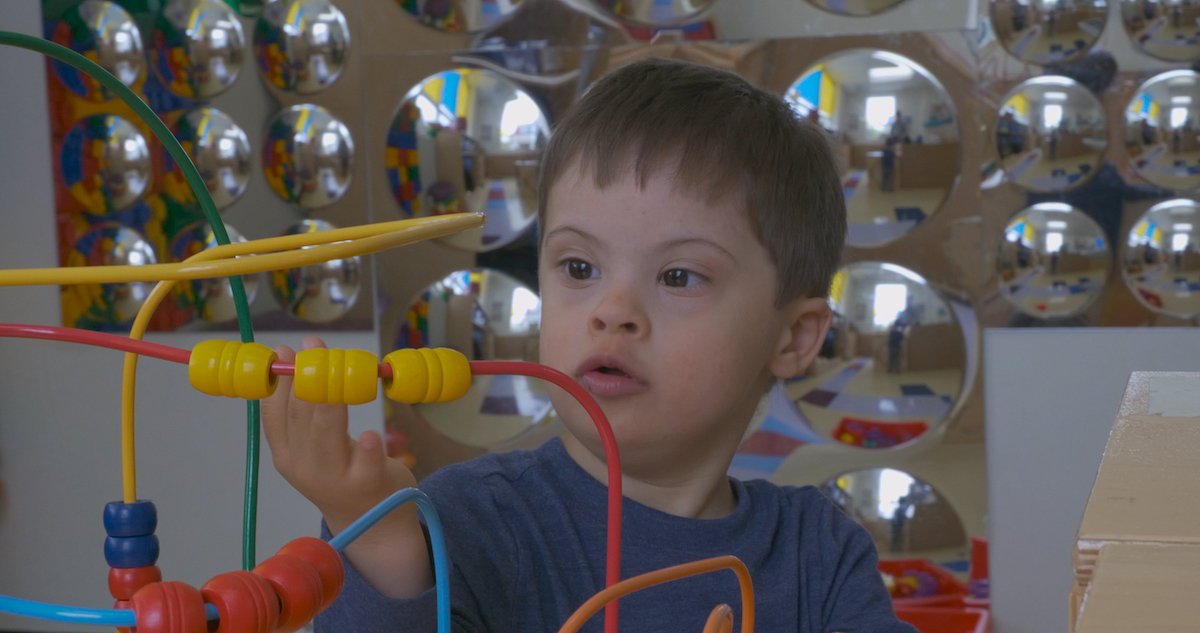FORGET ME NOT

(The 2022 Slamdance Film Festival ran January 27-February 6, all virtually. Check out Chris Reed’s movie review of Forget Me Not. Like what you see here on Hammer to Nail? Why not pay just $1.00 per month via Patreon to help keep us going?)
“Inclusion” is a word with many meanings and uses in our 21st century. A college professor such as I encounters it mostly in the context of DE&I (diversity, equity, and inclusion) initiatives that center around a push to make not only faculty and student bodies reflect greater representation across gender, racial and ethnic lines, but also to broaden the curriculum to encompass the full range of human experience and give voice to traditionally marginalized peoples. And though the focus has lately been more on race, those with disabilities, mental and physical, should certainly be a part of that ongoing discussion, as well.
In his new documentary, Forget Me Not, director Olivier Bernier (The Sunset Sky) trains his lens on children with Down syndrome and their parents’ efforts to prevent them from being segregated in special-education classes. Staying primarily, if not exclusively, in the New York metropolitan area, Bernier follows his subjects as they challenge a system designed to push any and all difference to the side, where it can be more easily managed (as administrators may see it). The thought is that not only would it be harmful to the affected children, but also to those without their condition. According to actual scientific research, however, nothing could be further from the truth. And given that this inspiring movie was made with the help of a vast array of folks with intellectual disabilities (as the end credits display), inclusion clearly can work.
First, we start with the worst-case scenario of what mainstream society can do to those it deems less than normal. Bernier begins the movie with footage from Letchworth Village, a now-abandoned residential facility for the disabled in New York’s Rockland County. From those unpleasant images (to which he will return, in greater detail, later), he jumps to his own wife, Hilda, pregnant with, then giving birth to, their son Emilio. The OBGYN doctor informs them right away that their baby has Down syndrome. And then, in a montage of quotidian events throughout Emilio’s first year, we see his growth and the love they have for him.
Hilda, herself, is a former New York City special-ed teacher, but there’s nothing like having the reality of disability and how others view it brought home to you via your own child. Plus, she knows first-hand how impossible it can be to leave the segregated classroom once firmly established within it. As Emilio approaches 3, the family prepares to make the case for his inclusion in a regular school space. Apparently, there is some legal recourse to ensure that happens, but there is equal opportunity for the school system to prevent it.
We don’t just spend time with Hilda, Emilio, and Olivier Bernier, but also meet other families in similar situations. We travel to Boston, too, where the Henderson K-12 Inclusive School shows what happens when no segregation takes place at all (plot spoiler: only good things). Along the way, experts explain the pros (there appear to be no cons) of inclusion. Nevertheless, it’s a hard sell. Reading this, you may wonder, yourself, how it works. To which I say, watch Forget Me Not, and learn a thing or two (or three).
– Christopher Llewellyn Reed (@ChrisReedFilm)
2022 Slamdance Film Festival; Olivier Bernier; Forget Me Not documentary movie review











